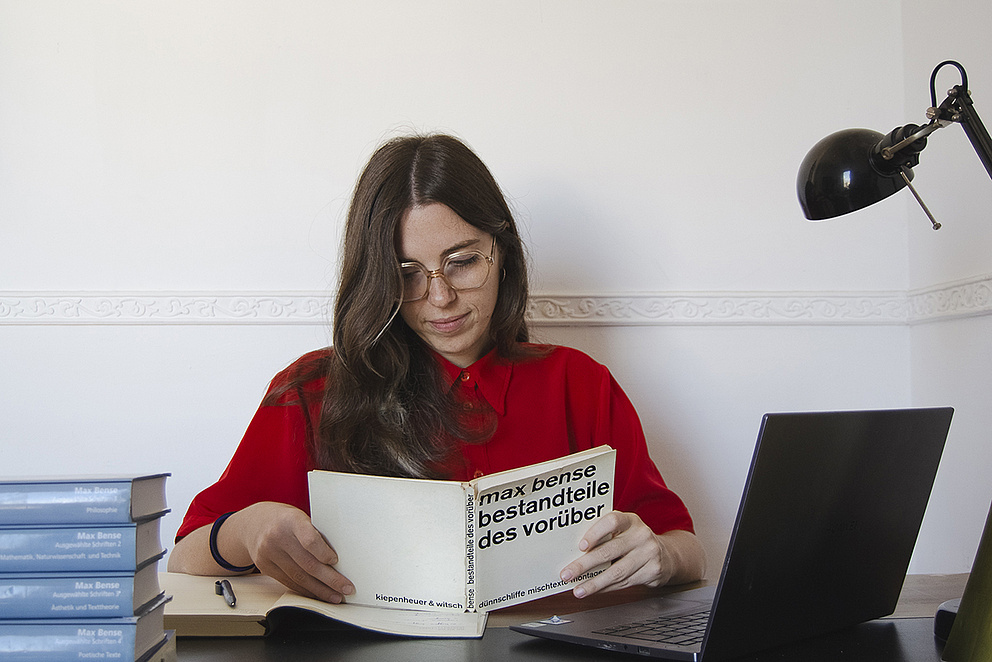
Quickly scribbled letters, breathless sentences with hardly a blank space. “The first time I was faced with the pages from the diaries and manuscripts in Max Bense’s estate at the Deutsches Literaturarchiv Marbach, I just wanted to cry. I could hardly find my way through the dense material. I only gradually managed to decipher his writing; it was like learning a new language,” says literary scholar Rose Coppola, looking back.
A Humboldt Research Fellow in the team around her host, Stephan Kammer, in the Department of German Studies at LMU Munich, she was working on the poetry of the writer, mathematician, academic and philosopher, Max Bense. For two years, the Naples-born Germanist negotiated unexplored terrain, investigating how Bense applied the concept of artificiality to his own poetic output.
In those two years, I became stronger and more independent. The fact that I managed to complete the project alone, despite all the challenges, has increased my self-confidence for my future research.
New approach
Apart from the quality of research and contact with other Germanists in the country, direct access to Bense’s estate was what really decided Coppola to apply for a fellowship in Germany. “Without going through his diaries and manuscripts this project would not have been possible,” says Coppola. “There is hardly any secondary literature. Every theory I proposed had to be totally verifiable.”
Through such intensive engagement, Coppola managed to find a new approach to Bense’s work. “Thanks to my philologically based text analysis I was able to clear up previous misconceptions about Bense having exclusively programmed and used computers in his lyrical practice. I’m just preparing a publication on it.” This was a research undertaking that allowed Coppola to grow both professionally and personally. “In those two years, I became stronger and more independent. The fact that I managed to complete the project alone, despite all the challenges, has increased my self-confidence for my future research.”
Critical approach to the present
The themes Coppola works on are closely related to her own world. “Literature enables us to perceive daily life differently. My research affords me a critical approach to the present.” Bense’s work and his observations on “technical existence,” in which humans and machines merge synthetically, helped Coppola to make more conscious technological decisions.
Whilst literature grants her an approach to the world of today, in her childhood and youth, the opposite was the case. “I grew up in a petit bourgeois provincial town and spent a lot of time reading at an early age. Literature helped me to dream myself out of my everyday existence.” One of her favourite poems during her school days was “I wandered lonely as a cloud” by the English Romantic poet William Wordsworth. She originally decided to study German because she wanted to be able to read the German philosophers in the original.
If the academic system is to become diverse, classism must already be reflected on at school. All children need the same opportunities and marginalised groups special state support.
Coppola also fosters her fascination with language as a member of the German-Italian translation collective, wandering translators, and by translating Forschungsbericht (Research Report), a book by her favourite author, Hubert Fichte. “I am very interested in his intersectional view of grievances. I like the way he breaks down every façade of morality, writes controversially about the Western colonial notion that white privilege is omnipresent.”
Intersectional view
Coppola is constantly reminded how various forms of discrimination overlap. “If the academic system is to become diverse, classism must already be reflected on at school. All children need the same opportunities and marginalised groups special state support.” The way key positions in science are filled is something Coppola thinks is decisive. “I have met great women professors who didn’t wield their power in a patriarchal manner but through the intensity and passion of their teaching.” And what she also observed: “There is too much rainbow washing. Some institutions parade the diversity label but don’t actually trigger any real change.” For the future, she hopes “that, one day, the academic world will be open to everyone, and diversity will be more than just a hashtag.”
Text: Esther Sambale
